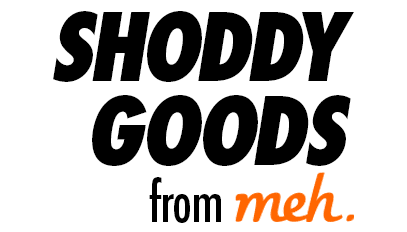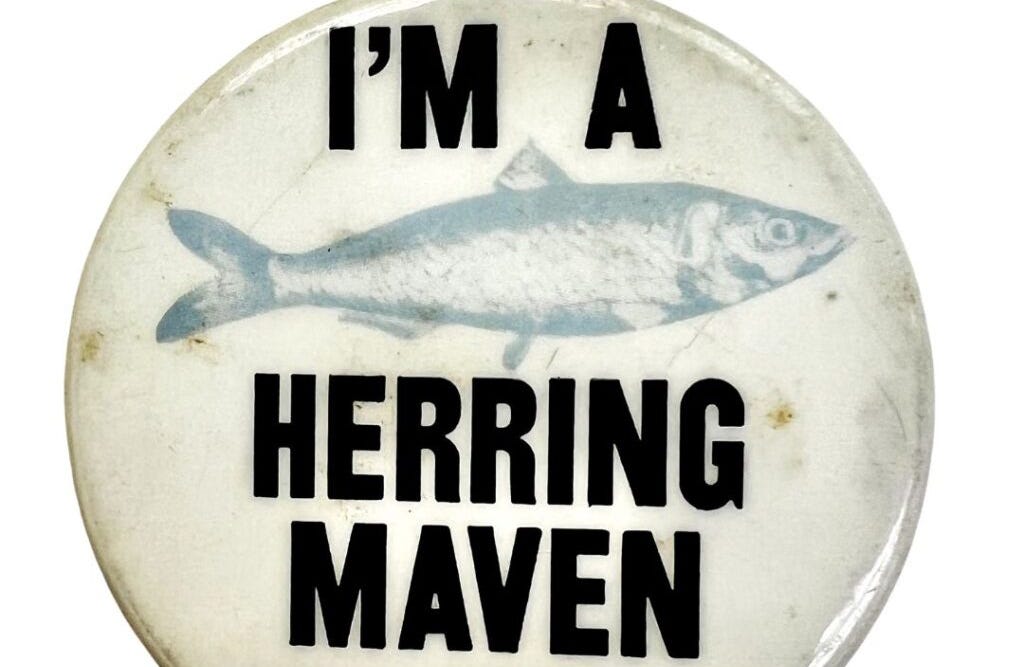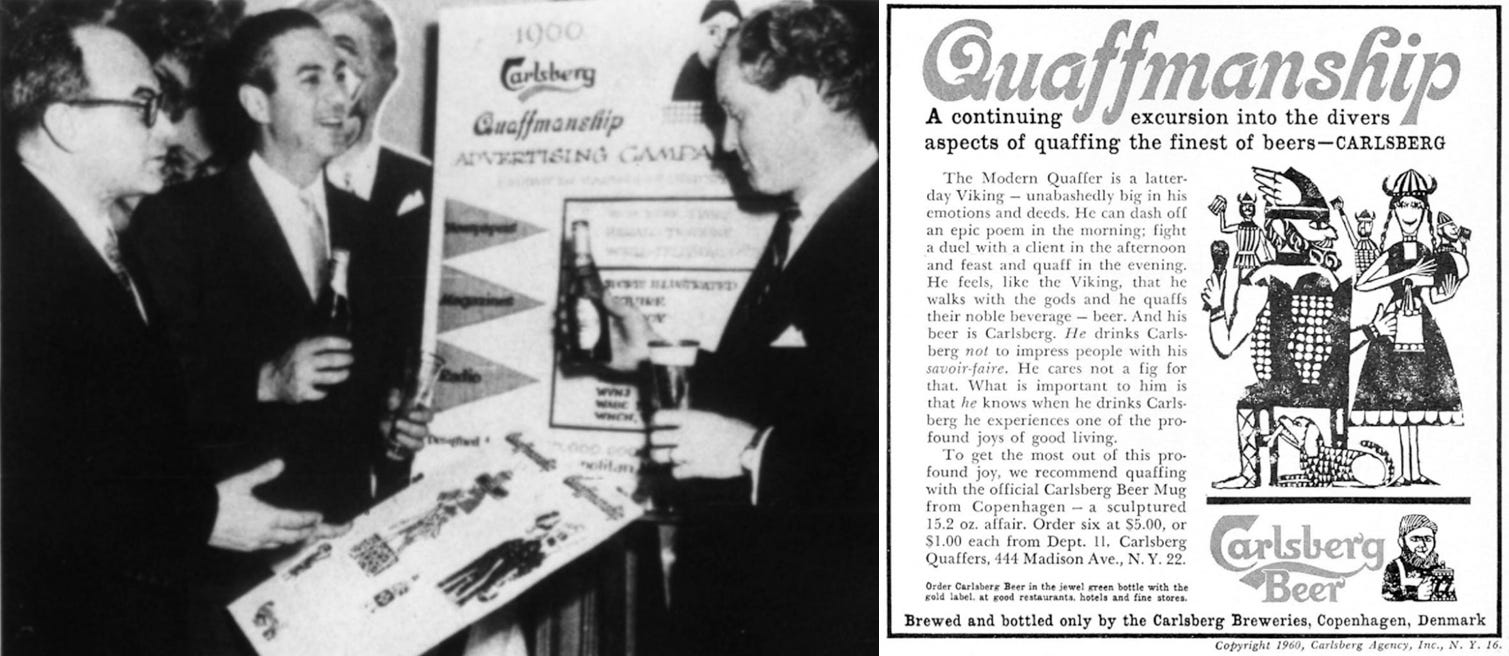The maven maven: Shoddy Goods 054
5
I went looking for the roots of a word, and I found a new hero. Hey, Jason Toon here. In this Shoddy Goods, the newsletter from Meh that tells stories about consumer culture, I look at how an ad campaign for jarred fish left its mark on English, and how an oddball copywriter left a mark on me.
The word “maven” never struck me as a particularly recent innovation in the English language. Its meaning - someone who is really into something and knows a lot about it, like a movie maven or racquetball maven or promotional satin baseball jacket maven - seemed pretty established to me. Its sound isn’t anything unusual, either: other -aven words like haven, raven, and shaven are centuries old.
So imagine my surprise when I fell down a rabbit hole of old articles about advertising and discovered that “maven” has only been in common English usage since about 1965. It’s originally a Yiddish word. And it owes its popularity to a series of radio commercials selling canned herring.
As an English word, “maven” is younger than Michael J. Fox or Dennis Rodman. Insert head-exploding-in-a-mushroom-cloud emoji.

I used to say I’d never wear branded merchandise
For a writer, there’s no greater achievement than for something you wrote to take up permanent residence in the dictionary. But who was that writer? In looking for the answer, I unexpectedly happened upon something of a kindred spirit.
A latter-day Viking
Martin Solow wasn’t your typical adman. After serving in World War II, he took his journalism degree into editorial positions at labor newspapers published by the AFL-CIO union federation. That led to a job as assistant to the publisher at the liberal magazine The Nation, which in 1953 published the first-ever article by a medical professional about the connection between lung cancer and smoking. Solow wrote in the magazine that the piece caused a stir among his friends in advertising, and was “circulated far and wide throughout the huckster fraternity.”
Within a few years, Solow jumped the fence to become one of the hucksters. He founded the first in a series of ad and creative agencies with himself as copy chief. While he was popular enough among his colleagues to be elected chairman of various industry clubs, Solow never climbed the ladder of the big agencies, preferring to take on small, unique clients who gave him the freedom to be creative.

Look at this quaffing hipster: Martin Solow (2nd from left) pitching fancy beer before it was cool
One such client was Carlsberg beer. In 1960, imported beer had virtually no presence in America, so the Danish brewery gave Solow free reign to crack the market. His “Quaffmanship” campaign zigged where everyone else was zagging. Instead of photos of glistening bottles of beer, the ads were illustrated with folk-art woodcuts that underscored Carlsberg’s foreign origins (and were cheaper to print than full color).
Instead of one pithy slogan like “This calls for Budweiser”, the ads were packed with jokey copy like “The modern Quaffer is a latter-day Viking - unabashedly big in his emotions and deeds” and little beer history lessons like “Thomas Jefferson and Samuel Adams were noted quaffmen, and George Washington even had his own private recipe for brewing beer at Mount Vernon.”
The campaign was a war on “blandness,” Solow told the New York Times. "Beer companies are trying to outdo one another with claims that reinforce the notion beer has no taste. Always round; never bitter; never sweet. Light, dry, etc. In essence, they seem to be trying to reassure people that the beer really has no taste.
“One gets the impression that things will become so light and so dry we’ll be breathing, eating and drinking nothing but air - hot and cold - in the brave new world of tomorrow.” If America’s corner taverns weren’t quite ready to go Danish, the campaign boosted Carlsberg sales by 70% by reaching a subculture of adventurous connoisseurs. I get the sense that was just fine with Martin Solow.
Staten Island drinking song
Maybe it was Solow’s success with Carlsberg that caught the eye of another purveyor of a European delicacy. Vita Foods was an American company, but it had been founded by two Czech immigrant brothers in 1911. Its line of seafood catered to the Old World tastes of a white ethnic market, and its flagship product was jarred herring in sour cream. Not the most obvious mainstream attraction in the America of 1964, where Ozzie & Harriet and The Donna Reed Show still ruled the airwaves.
“If something is authentically ethnic, it crosses boundaries,” Solow said. Again, his campaign leaned into the product’s exoticness, starting with the name of the lead character: the Beloved Herring Maven. “Maven” was a Yiddish word that literally translates as “one who knows”, and that colloquially meant more or less what it means now, but at the time meant nothing to anybody who didn’t speak Yiddish.
The radio commercials that were the backbone of the campaign didn’t shy away from the ethnic angle, either. In a heavy “New York Jewish” voice, the Beloved Herring Maven delivered rambling soft-sells like “More people eat Vita cream herring than any other kind. Between you and me, it certainly sounds like the folks over at Vita are not doing anything wrong” and called the Vita jingle “a traditional Staten Island drinking song.”
If that voice sounds familiar, there’s a reason. Solow cast Allen Swift, a man of a thousand voices who had already recorded thousands of commercials. He would voice characters on cartoons like Popeye, Underdog, and Tom & Jerry, ad mascots like Twinkie the Kid and the Frito Bandito, and various characters on Sesame Street and The Howdy Doody Show. When the latter’s creator Buffalo Bob Smith fell ill, Swift filled in as host and voice of Howdy for over a year.

A face for radio: Allen Swift, the voice behind 15,000 commercials
And still, news stories of the time cited Swift as the Beloved Herring Maven first and foremost. That’s one small example of the impact this campaign had in the five short years it ran, from 1964 to 1969, when Vita was acquired by a conglomerate who took their ad business elsewhere. A bigger example, of course, is in dictionaries to this day.
Maven endures
Like other borrowed Yiddish words, from klutz to chutzpah to glitch to schmooze, “maven” perfectly met a linguistic need, summing up enthusiasm and authority and connoisseurship in one punchy little word. Once the Vita campaign brought “maven” to light, it took off on its own among people who wouldn’t know a herring from an earring.
“Newspapers and magazines use maven so often, and so unerringly,” wrote Leo Rosten in his 1989 book The Joys of Yinglish, “that the word has become an integral part of English. In fact, maven is now in The Oxford American Dictionary.” No less a verbal fussbudget than William Safire adopted the nickname “The Language Maven”.
Malcolm Gladwell sometimes gets credit for spreading the word in his 2000 bestseller The Tipping Point, adding “maven” to the corny lingo of management-speak. But both the word, and its original popularizer, deserve better than that. Millions of people who will never know Solow’s name have him to thank for this useful little word, as handy in conversation as in a brand name or book title.

Everybody’s a maven these days
Solow would live until 1991, writing a novel, briefly reviving the Beloved Herring Maven for Vita in 1983, and running a series of small agencies. At the low point of one of those boom-bust cycles, he once told the Times, “The only thing I never understood was how to make money.”
But personally, he’s an inspiration. A humble guy just trying to make a living from the only thing he knows how to do, writing. A working-class nerd driven by an instinctive sympathy for the underdog. A restless creator who couldn’t resist trying to make even the most mundane task a little funnier and weirder and more interesting. Is it any wonder I’ve become a Martin Solow maven?
I’ve always been intrigued by where words came from and what triggered their popularity. You can see maven’s rise in the Google ngram viewer, which tracks appearances in print, and see it really starts growing right at this 1965-1969 timeframe matching the ad campaign. Know any good word origin stories? Or just got a favorite word? Let’s hear about it in this week’s Shoddy Goods chat.
—Dave (and the rest of Meh)
Consumerism mavens are invited to help themselves to these past Shoddy Goods stories, but you’ll have to bring your own herring:
- 14 comments, 22 replies
- Comment
I use superfluous far more than is necessary, and I’m also a fan of the oxford comma.
@capnjb So you use superfluous superfluously?
@Thumperchick I feel like it’s earned it
@capnjb @Thumperchick YES!!! to the Oxford comma!
Underused word of the year for me: doldrums
@zebazga isn’t that the Mehs?
Guess I can’t include a link. Recently found the site interestingliterature and am hooked. Visit and learn how avocados are more amazing than you thought. Or, how you’ve eaten a testicle.
@zebazga trying link again, cause this makes is research/history/education at it’s humorous best. https://interestingliterature.com/2025/06/avocado-etymology/
My 2 cents
I know that mediocreot’s favorite word is awesome
EVERYTHING IS AWESOME!
@mediocrebot seems to like the word captcha too.
As a fellow robot, I understand your pain.
Interesting topic! One that sticks with me is “shoddy” originally meant recycled wool cloth in 19th century England, often poor quality. It caught on during the Civil War when cheap uniforms were blamed on “shoddy contractors.” Funny how it shifted from a textile term to a general word for poor quality.
Related to word history, on a TV show it was mentioned that among other words, Shakespeare put words like addiction and bedroom into print. Doesn’t mean he “invented” them but information is sketchy — if in fact he existed at all as we think we know of him.
Interesting page with a lot of research and disclaimers:
https://www.shakespeare-online.com/biography/wordsinvented.html
Enshittification.
https://en.wikipedia.org/wiki/Enshittification
@narfcake I have been looking for this word because of nextdoor. Well timed, and thanks for link with supporting information of the word’s might.
@narfcake kakistocracy - it has no antonym!
@narfcake Use the word in a sentence. “The health insurance industry seems to have long been in the pre-die state of enshittification.”
A friend from my tiny group of poets sent me a note about the word, oblivion, hoping we could have a little chat about it. We never got around to it, but the other day I finally looked into the history of its evolving meaning. Now we really do have to talk.
TIL that Stan Fischler’s nickname (the Hockey Maven) was inspired by the Vita commercials.
this link here
There’s a possibility “OK” comes from a misreading of “oll kleer” (as in “the OK corral” being a neutral meeting ground in the American wild West); the English language is still full of “close enoughs”.
@pakopako I remember reading ‘oll korrect’ specifically during a time period where misspellings were a popular way of making slang. (Which I used to think was ridiculous, but now pwned is a word.)
@dave @pakopako I’m sorry, which button am I supposed to push?
@capnjb @dave @pakopako Coincidentally, I just saw this article:
https://www.npr.org/series/g-s1-57824/word-of-the-week
NPR says it’s a word …
@dave @Kyeh @pakopako I mean, I’m kind of smart but I still don’t know when to use OK vs. Okay vs when I’m in Canada looking for hardwood so I ask Oak, eh?
@capnjb @dave @pakopako
Okey Dokey. (Oakey?)
@capnjb @dave @Kyeh @pakopako But is it “OK” or “ok” or are both acceptable?
@capnjb @dave @ItalianScallion @pakopako I like “Okay.”
@dave @ItalianScallion @Kyeh @pakopako They’re both OK
@capnjb @dave @ItalianScallion @Kyeh @pakopako

This article reminded me that I love sour cream herring and haven’t had it in a long time. Or kryddersild (spiced herring).
My favorite word is currently
defenestrate.@Thumperchick learned that word as a kid reading Yo Joe ninja comics.
Somewhat related, the Romans had the Gemonian stairs: as a form of execution, offenders were pushed off and rolled down several flights.
I quite like “shambolic.”
It describes my life very well.
Also if you love words you might already know this, but they’d a daily email you can subscribe to that is all about words and their origins: https://wordsmith.org/awad/index.html
Ah this one was shared by YakkoTDI back in April here